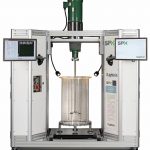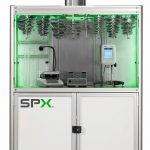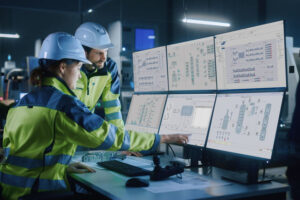The best way to optimise a mixing process is to run tests and trials with the actual products that need to be blended. In the chemical and mining industries this can often be a challenge, as transporting fluids to a laboratory setting may be highly impractical, dangerous or undesirable. There is, however, another option – no matter where you happen to be in the world.
How to get more from the mixing process
On-site laboratory testing
The best way to optimise a mixing process is to run tests and trials with the actual products that need to be blended. In the chemical and mining industries this can often be a challenge, as transporting fluids to a laboratory setting may be highly impractical, dangerous or undesirable. There is, however, another option – no matter where you happen to be in the world.
Through its Lightnin brand, SPX has been improving mixing processes for over 90 years. At its state of the art laboratory in Rochester, New York, USA, it has worked closely with many customers in the chemical industry to develop efficient mixing technology for even the most challenging of applications. Alongside a detailed understanding of the science of mixing, laboratory testing has proven to be the most effective way to obtain desired production targets including better mixing results, increased yield, faster blend times and reduced power consumption. It is not, however, always practical or indeed possible to ship fluids to the laboratory due to restrictions on the movement of chemicals and the possible degradation of active ingredients caused by transport times and conditions.
Laboratory testing for mixing processes has turned out to have clear benefits for the chemical industry. In applications where production capacity with the currently installed equipment cannot meet market demand, SPX has been approached to assist in optimising both the mixing equipment and the process internals as a way to boost production. One specific example of this includes a customer with a process utilising SPX equipment that was installed at plants throughout the world. The demand for the product from this process was extremely high and the customer had been unable to increase output accordingly with the existing equipment design. SPX worked with them to understand their process and the areas which were constraining production. Through a combination of lab testing and computer modelling, SPX was able to put forward a solution that generated a substantial increase in product output by modifying equipment and tanks. Based on this project, the customer is now retrofitting all reactor installations for this process around the globe and collaborating with SPX on a second set of changes that will facilitate further increases in production.
To enable global customers to explore the advantages of the latest mixing technologies and benefit from laboratory expertise more easily, SPX has replicated equipment available at its leading mixing centre in Rochester into a portable solution. Known as the Lightnin Minilab, this compact laboratory can be shipped to chemical plants all over the world for on-site testing.
Mobile testing equipment
The Minilab is shipped to the site in its own packing case; it is suitable for any international power outlet and simply requires a power connection on site. Its use is supported by a trained Lightnin laboratory technician or application engineer, who works with the customer’s team to ensure efficient testing and the desired mixing characteristics. SPX’s well proven, proprietary software is employed to record and analyse mixer performance and characteristics. The mixer drive is connected to a secure data acquisition system: the incorporation of additives or any changes in the mixing volume are accurately recorded using scales within the test skid.
The Minilab offers extensive testing capability with multiple configurations that can be quickly adapted to assess and compare data across test runs. It can have a variety of impeller and baffle configurations with on-centre or off-centre mixer mounting. Different types of impellers and shafts can be tested and the system is fully equipped with a viscometer and other laboratory equipment, as expected at a full size test facility. A clear acrylic tank, which can be modified to flat, dished or coned format in line with the production mixing vessel, is mounted on a mirror to allow easy viewing and filming of the process taking place at the bottom. A pump enables rapid, controlled filling and emptying of the tank while the height of the mixer is adjusted via the integral electronics, so that the critical distance of the impellers from the bottom of the tank can be set simply, quickly and accurately.
The Minilab system is suitable for testing liquid blending and solid suspension applications. It covers a wide variety of requirements including mixing two miscible liquids of different viscosities up to 15,000 cP. A gas sparge can also be added if required, to permit gases to be introduced into the mixing process.
Exploring the best options
Mixing is a science and the Minilab provides customers with an easy way to explore the best options for their particular process and products. For example, it could be that simply changing a machine’s impeller type is enough to increase the yield, rather than replacing the entire machine. Whatever the set-up, there are clear benefits to having the test facilities on site. Plant operations can continue without having to deploy personnel off-site at a laboratory and customers can be certain that their own experts will be on hand should their input be required. Testing carried out within the plant environment also ensures no disparities are experienced due to varying environmental conditions or the degradation of the products being tested. The confidential testing service further negates the need for intellectual property to leave the premises and often means that real products can be tested rather than simulants.
Conclusion
Mixing is not about a machine specification but about getting the desired results from a process. The Minilab plant was specifically developed by SPX in response to customer needs and is available for shipment globally. It offers efficient, economical and expedient testing, providing essential data to support process optimisation that could otherwise be difficult to obtain. It puts the expertise and technology of a proven, world-leading laboratory facility at the customer’s fingertips and helps them get more from their mixing processes, whatever challenges they face.
www.cpp-net.com search: cpp0315spxlightnin
Dan Lee
Dan Lee
Global Product ManagerLightnin/Plenty MixersSPX Flow Technology
Share:








